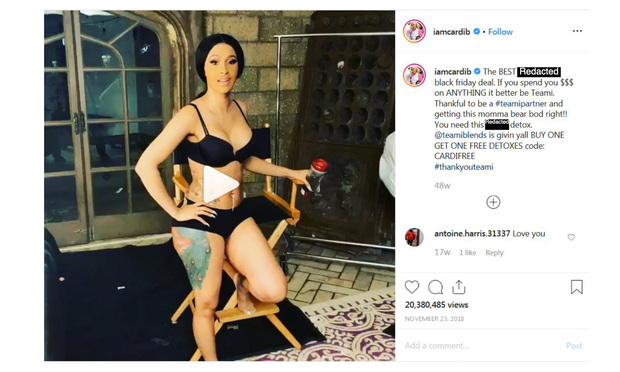What Will Happen to Influencer Marketing After FTC's $1M Teami Tea Settlement?
The Federal Trade Commission's action against Teami Tea could underline the agency's shift toward a more aggressive enforcement strategy that puts advertisers, media platforms and influencers on high alert.
March 11, 2020 at 05:49 PM
4 minute read
Social media advertising might become steeped in disclosures—and new tech—after the Federal Trade Commission took action against Teami Tea and online celebrities hawking the detox tea.
Teami Tea agreed to a $1 million settlement with the FTC over its unsubstantiated weight loss and health claims. But the FTC didn't just go after the company, it also issued stark warning letters to its online influencer "partners," including Cardi B and Jordin Sparks. Social media followers had to click "more" to see the disclosure on the celebs' posts promoting the tea, in violation of commission guidelines and the company's own procedures, according to the complaint filed Friday in the U.S. District Court for the Middle District of Florida.
The agency even threatened "legal enforcement action" against influencers in the future. Richard B. Newman, an FTC investigation and defense attorney at Hinch Newman, said influencers must take the FTC guidelines for clear and conspicuous disclosures seriously or face potential legal and financial trouble.
"Depending upon a number of legal and factual considerations, unless remedied, individual influencers that fail to make adequate disclosures about their connections to marketers risk, without limitation, the FTC issuing [civil investigative demands] or immediately proceeding to federal court to obtain injunctions and disgorgement of ill-gotten gains," Newman said in an email.
Renée Appel of Seyfarth Shaw in Washington, D.C., said the action is somewhat of an anomaly. "It's the first of its kind where we've seen the FTC utilize its enforcement powers through the federal courts," Appel said. "To date, the FTC has kept a lot of enforcement measures related to the influencers more or less in-house, through their administrative proceedings and warning letters."
>> Need to keep up with the latest news on how technology is changing the legal industry? Sign up for the What's Next newsletter here.
The $1 million financial penalty—reduced from the $15.2 million in total sales from the product, because of inability to pay—is also impressionable, she said. In past influencer marketing actions, there's generally no fault and no penalty, Appel said.
The complaint also emphasized form over substance, she said, focusing on the placement of the disclosure below the cutoff where readers would have to click to see more. "It really puts a finer point on the issues that the FTC has raised that, 'Hey you can have #ad, but if it's buried in your text or not in your video, the FTC is going to call it out.'"
The FTC's action means it's not enough to have an adequate contract or policy. "You kind of need an added layer of surveillance," she said. Appel expects to see more resources devoted to compliance oversight. Advertisers might change their agreements to include indemnification if the influencer doesn't follow through with guidelines or provisions that payment is contingent on compliance. "The flip side of that is while it insulates companies, it creates a little bit of risk exposure to the influencer who is being held to a higher level of accountability," she said. "So they might demand more money."
The enforcement action could also inspire new legal tech. "It sounds crazy, but you might see new products evolve and companies coming out with surveillance software," she said. The technology could track partners to ensure compliance or collect data about influencers to help inform companies about which celebs take compliance seriously, she said.
The action follows the FTC's rollout of updated endorsement guidelines for influencers in February. In a statement, Commissioner Rohit Chopra said the FTC would consider developing requirements for platforms, including Instagram, YouTube and TikTok, which facilitate and sometimes directly profit from influencer marketing.
"It's not just influencers that need to be in a heightened alert, but also these platforms like Instagram that are servicing this form of advertising," Appel said.
This content has been archived. It is available through our partners, LexisNexis® and Bloomberg Law.
To view this content, please continue to their sites.
Not a Lexis Subscriber?
Subscribe Now
Not a Bloomberg Law Subscriber?
Subscribe Now
NOT FOR REPRINT
© 2025 ALM Global, LLC, All Rights Reserved. Request academic re-use from www.copyright.com. All other uses, submit a request to [email protected]. For more information visit Asset & Logo Licensing.
You Might Like
View All
How We Won: BraunHagey’s $56M Trademark Win Over Molson Coors Upheld by 9th Circuit
8 minute read
'Immediately Stop Using' Pizza Puffs Term: Parties at Odds Over Judge's Injunctive Order Over Trademark

'Water Cooler Discussions': US Judge Questions DOJ Request in Google Search Case
3 minute read
Old Laws, New Tricks: Lawyers Using Patchwork of Creative Legal Theories to Target New Tech
Law Firms Mentioned
Trending Stories
- 1DC Bar’s Proposed Anti-Discrimination, Harassment Conduct Rule Sees More Pushback
- 2California's Chief Justice Starts Third Year With Questions About Fires, Trump and AI
- 3Justin Baldoni Sues Blake Lively and Ryan Reynolds for $400M in New Step in 'It Ends With Us' Fight
- 4Top Leadership Changes Coming for NJ Attorney General's Office
- 5SCOTUSBlog Co-Founder Tom Goldstein Misused Law Firm Funds, According to Federal Indictment
Who Got The Work
J. Brugh Lower of Gibbons has entered an appearance for industrial equipment supplier Devco Corporation in a pending trademark infringement lawsuit. The suit, accusing the defendant of selling knock-off Graco products, was filed Dec. 18 in New Jersey District Court by Rivkin Radler on behalf of Graco Inc. and Graco Minnesota. The case, assigned to U.S. District Judge Zahid N. Quraishi, is 3:24-cv-11294, Graco Inc. et al v. Devco Corporation.
Who Got The Work
Rebecca Maller-Stein and Kent A. Yalowitz of Arnold & Porter Kaye Scholer have entered their appearances for Hanaco Venture Capital and its executives, Lior Prosor and David Frankel, in a pending securities lawsuit. The action, filed on Dec. 24 in New York Southern District Court by Zell, Aron & Co. on behalf of Goldeneye Advisors, accuses the defendants of negligently and fraudulently managing the plaintiff's $1 million investment. The case, assigned to U.S. District Judge Vernon S. Broderick, is 1:24-cv-09918, Goldeneye Advisors, LLC v. Hanaco Venture Capital, Ltd. et al.
Who Got The Work
Attorneys from A&O Shearman has stepped in as defense counsel for Toronto-Dominion Bank and other defendants in a pending securities class action. The suit, filed Dec. 11 in New York Southern District Court by Bleichmar Fonti & Auld, accuses the defendants of concealing the bank's 'pervasive' deficiencies in regards to its compliance with the Bank Secrecy Act and the quality of its anti-money laundering controls. The case, assigned to U.S. District Judge Arun Subramanian, is 1:24-cv-09445, Gonzalez v. The Toronto-Dominion Bank et al.
Who Got The Work
Crown Castle International, a Pennsylvania company providing shared communications infrastructure, has turned to Luke D. Wolf of Gordon Rees Scully Mansukhani to fend off a pending breach-of-contract lawsuit. The court action, filed Nov. 25 in Michigan Eastern District Court by Hooper Hathaway PC on behalf of The Town Residences LLC, accuses Crown Castle of failing to transfer approximately $30,000 in utility payments from T-Mobile in breach of a roof-top lease and assignment agreement. The case, assigned to U.S. District Judge Susan K. Declercq, is 2:24-cv-13131, The Town Residences LLC v. T-Mobile US, Inc. et al.
Who Got The Work
Wilfred P. Coronato and Daniel M. Schwartz of McCarter & English have stepped in as defense counsel to Electrolux Home Products Inc. in a pending product liability lawsuit. The court action, filed Nov. 26 in New York Eastern District Court by Poulos Lopiccolo PC and Nagel Rice LLP on behalf of David Stern, alleges that the defendant's refrigerators’ drawers and shelving repeatedly break and fall apart within months after purchase. The case, assigned to U.S. District Judge Joan M. Azrack, is 2:24-cv-08204, Stern v. Electrolux Home Products, Inc.
Featured Firms
Law Offices of Gary Martin Hays & Associates, P.C.
(470) 294-1674
Law Offices of Mark E. Salomone
(857) 444-6468
Smith & Hassler
(713) 739-1250









